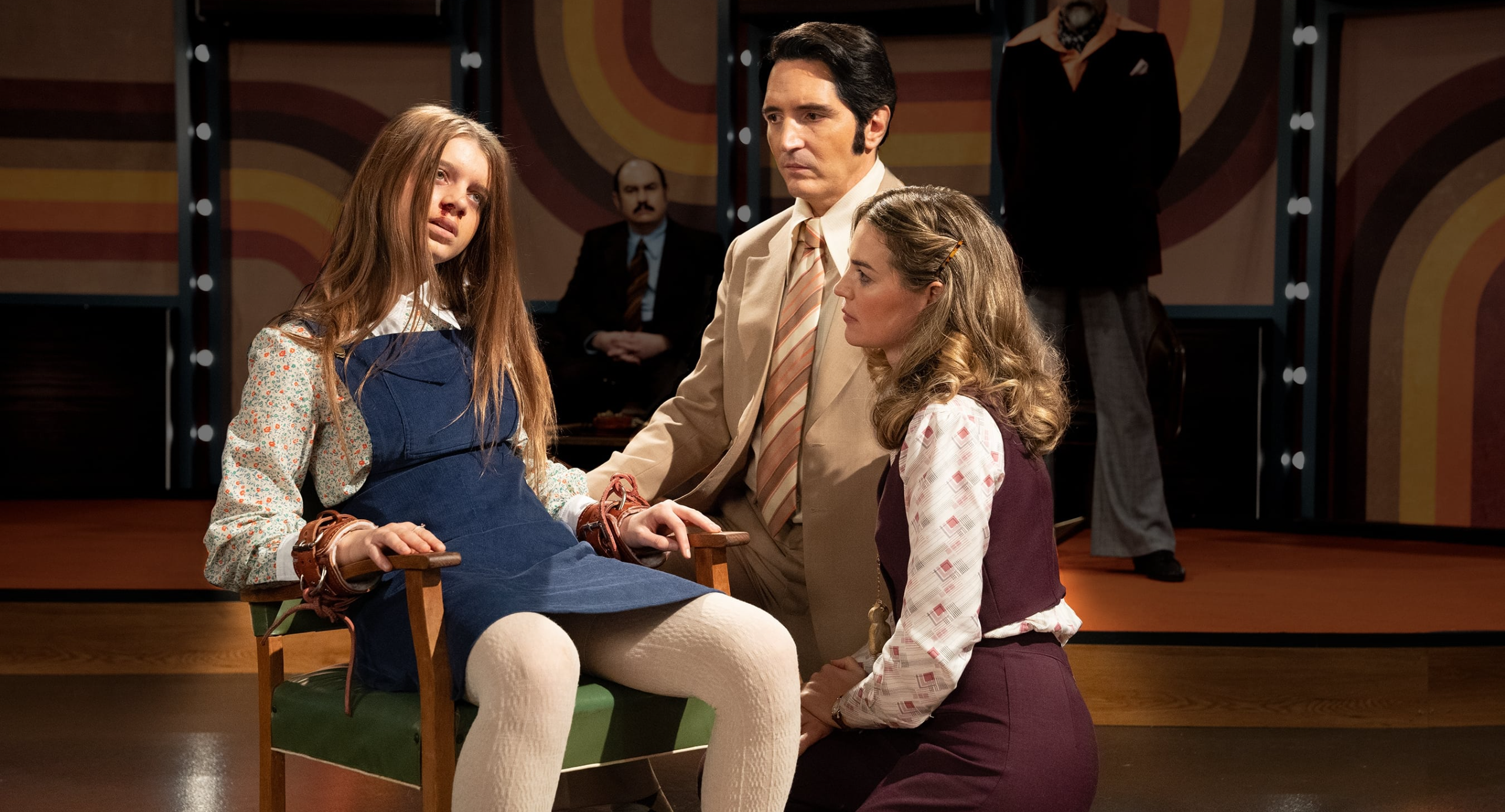Late Night with the Devil – Film Review
Published April 21, 2024

The challenge for filmmakers is to forge a new path or rekindle the sparks of horror’s past in fresh, compelling ways. With Late Night with the Devil, directors and writers Colin and Cameron Cairnes tackle this challenge head-on, offering a tantalizing mix of horror, suspense, and a nostalgic throwback to 1970s television. This film manages to carve out its own niche within the genre, leveraging the talents of David Dastmalchian, Laura Gordon, and a stellar supporting cast to weave a narrative that is both haunting and innovatively self-aware.
The premise of Late Night with the Devil is deceptively simple: in an attempt to rejuvenate his flagging career and the ratings of his talk show Night Owls, Jack Delroy (played with a mix of desperation and charisma by Dastmalchian) decides to host a Halloween special. The show takes a daring turn by featuring a girl purportedly possessed by demons, aiming to captivate and shock the nation. It’s a decision that, unbeknownst to Jack and his team, sets the stage for an evening of genuine terror and revelation.
What makes this film stand out is not just its plot but the Cairnes brothers’ approach to storytelling. By embedding the narrative within the framework of a late-night show from the ’70s, they capitalize on a mix of nostalgia and the inherent creepiness of dated television aesthetics. The grainy footage, period-appropriate set design, and costume all contribute to a sense of unease and authenticity, blurring the lines between the film’s reality and our own.
David Dastmalchian’s portrayal of Jack Delroy is central to the film’s success. Dastmalchian navigates the complex layers of his character with ease—Jack is at once a grieving husband, a desperate showman, and ultimately, a man facing the consequences of his hubris. The supporting cast, including Laura Gordon as the psychic June Ross-Mitchell and Ian Bliss as the skeptical producer Carmichael Haig, provide strong performances that ground the film’s supernatural elements in human emotion and conflict.
The decision to include documentary elements and found footage enhances the story’s credibility and immersion. This choice pays homage to the horror genre’s tradition while also playing with the audience’s expectations of what is real and staged. As the night unfolds, the tension escalates not just on screen but within the viewers themselves, creating a meta-experience that is both engaging and unsettling.
Despite its many strengths, Late Night with the Devil is not without its shortcomings. The film’s pacing occasionally falters, particularly in the buildup to the Halloween special. Some scenes feel unnecessarily drawn out, which dilutes the tension and delays the gratification of the unfolding horror. Moreover, while the film’s dedication to the ’70s aesthetic is generally commendable, it sometimes ventures into the territory of pastiche, which can momentarily pull the audience out of the story’s immersive grip.
Furthermore, the reliance on genre tropes—such as the possessed young girl and skeptical supporting characters—while effective, may feel familiar to seasoned horror fans. The film flirts with these conventions in a way that is initially intriguing but ultimately does not fully subvert them, leaving a sense of missed opportunity for deeper innovation within the genre.
However, these criticisms are relatively minor in the grand scheme of the film’s achievements. Late Night with the Devil is a compelling addition to the horror genre, offering a unique blend of psychological terror and a thoughtful meditation on grief, fame, and the cost of ambition. The Cairnes brothers demonstrate a keen understanding of horror’s power to not only scare but also to reflect deeper human truths.
The climax of the film is a testament to this, delivering not just visceral scares but also a poignant commentary on the nature of public spectacle and the human desire for connection, however twisted it may become. In a particularly chilling moment, Jack’s realization of the true horror he has unleashed mirrors our own fascination and revulsion with the spectacle of others’ suffering—a reflection that lingers long after the credits roll.
Late Night with the Devil is a film that both celebrates and critiques the horror genre. With strong performances, a cleverly constructed narrative, and a commitment to its unique aesthetic, it stands as a notable achievement in contemporary horror cinema. While it may lean into certain tropes and occasionally stumble in its pacing, these do not significantly detract from its overall impact. It is a film that deserves to be watched in the dark, preferably late at night, to fully appreciate its craft and the eerie resonance it has with our own media-saturated lives.
